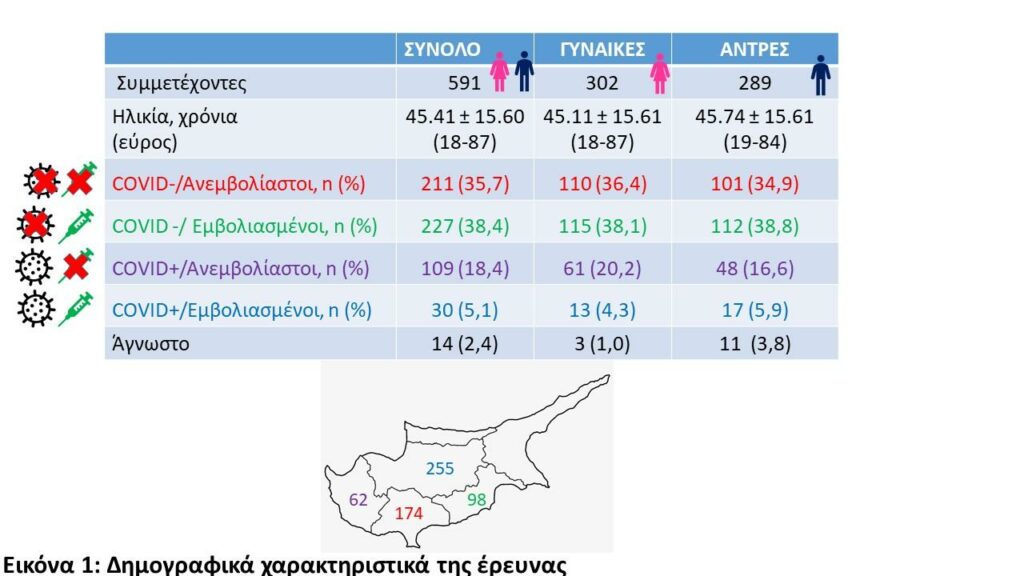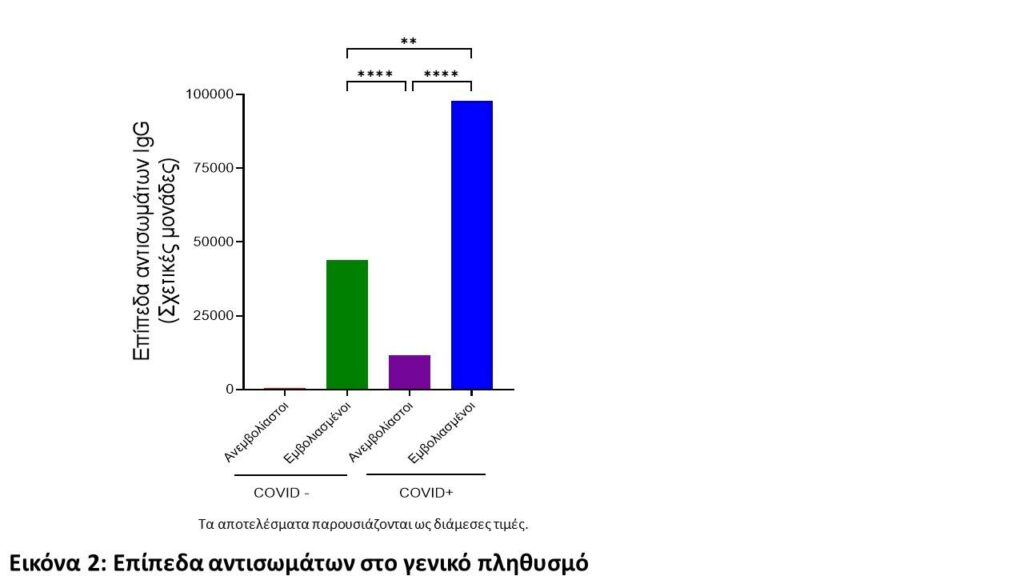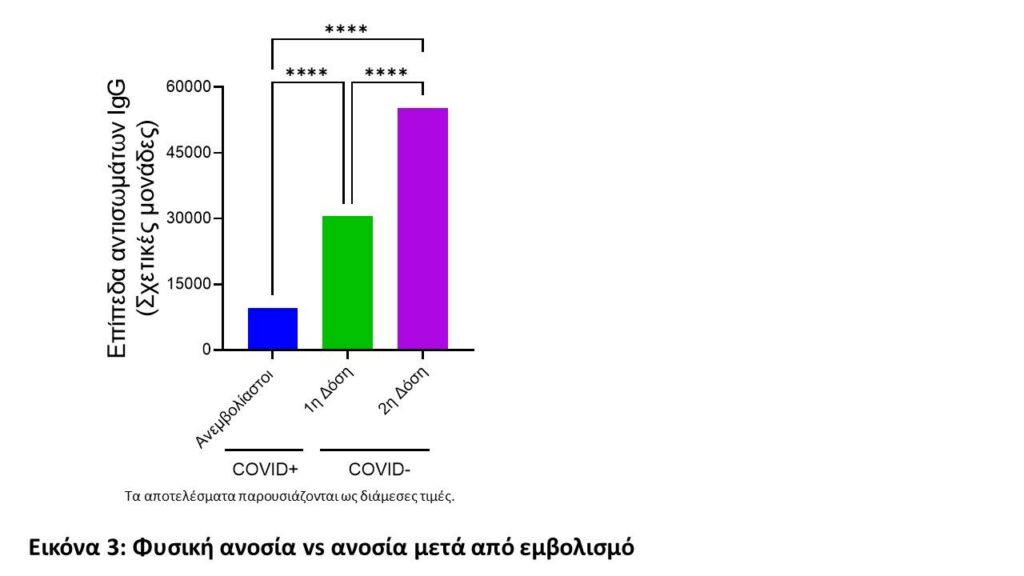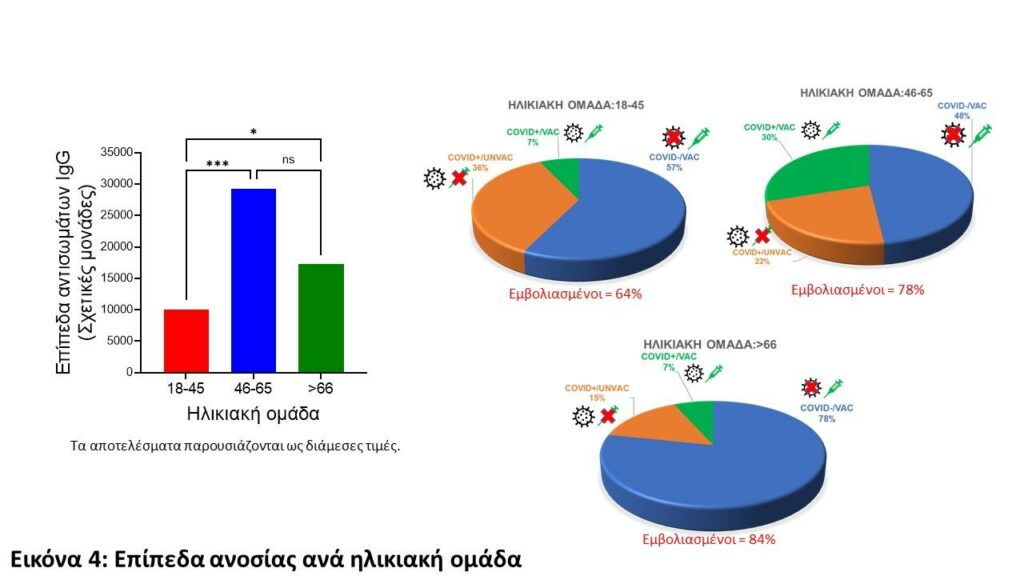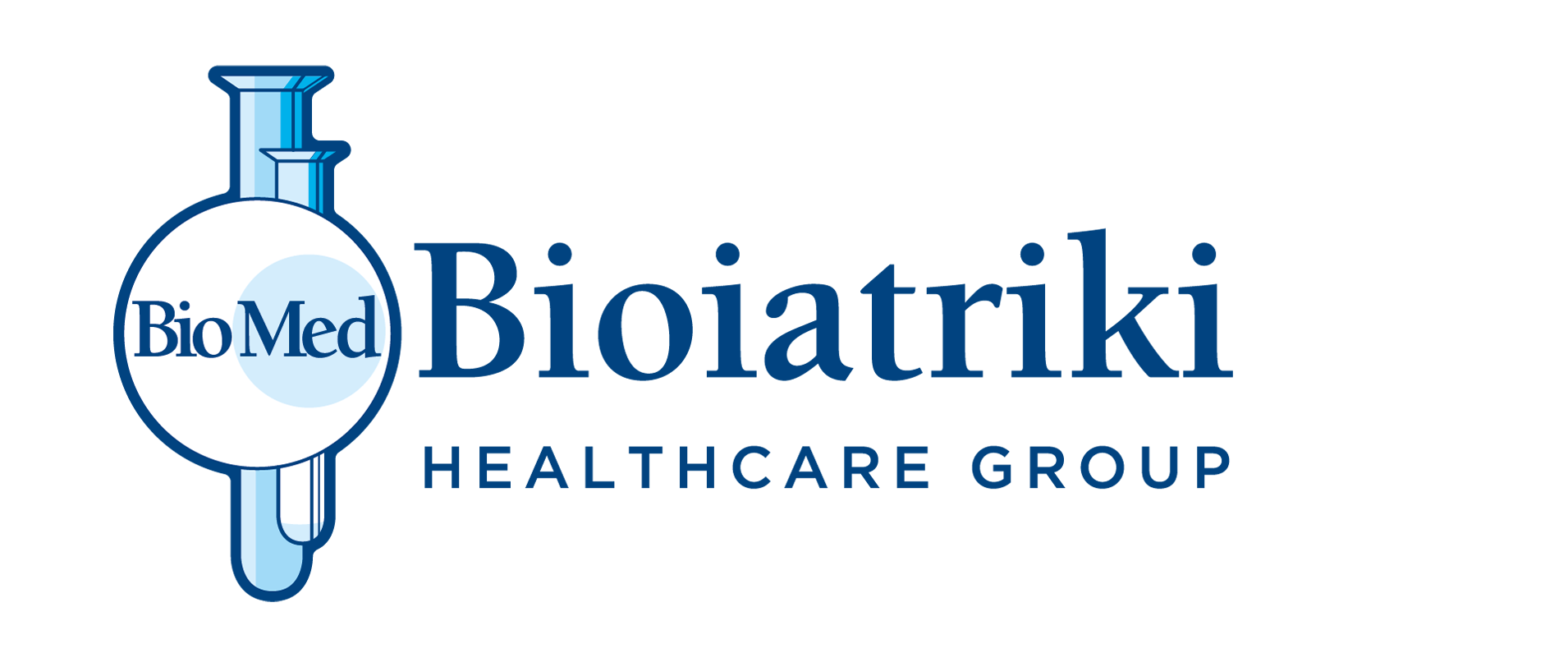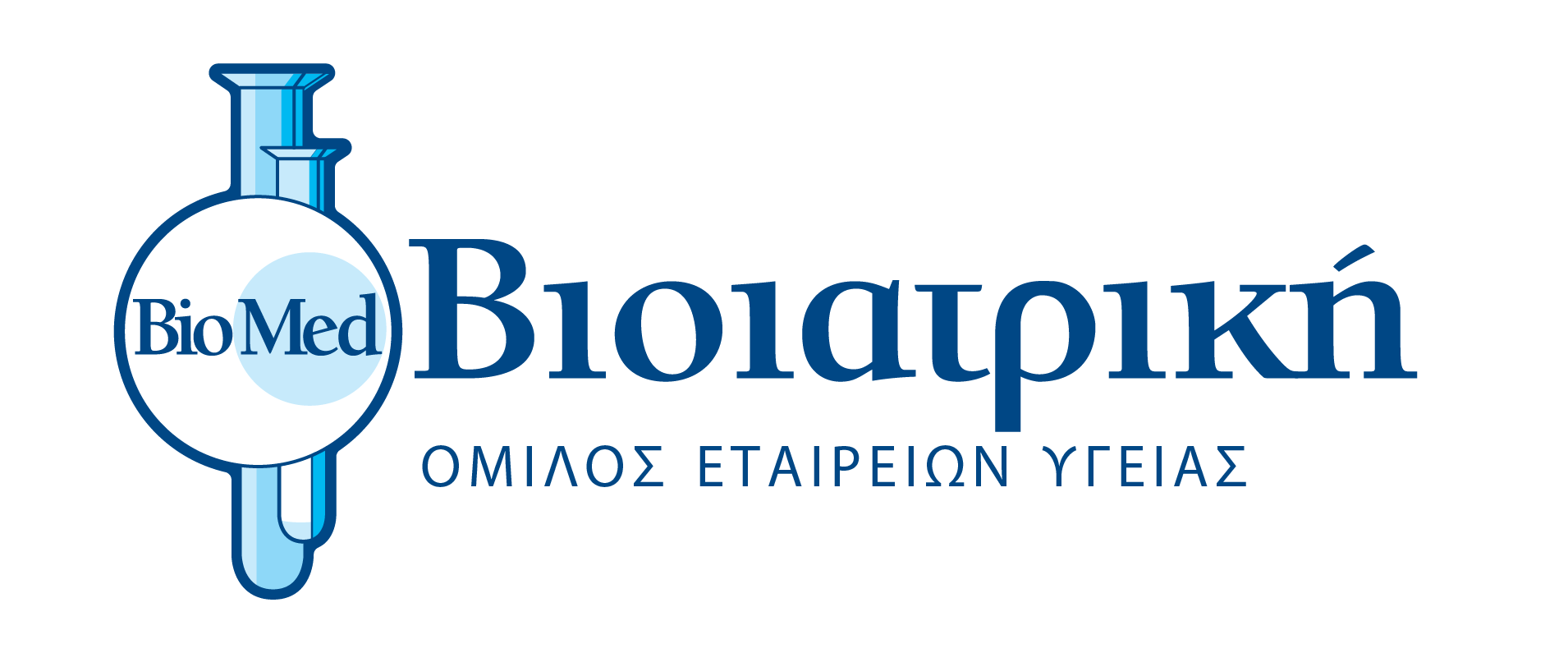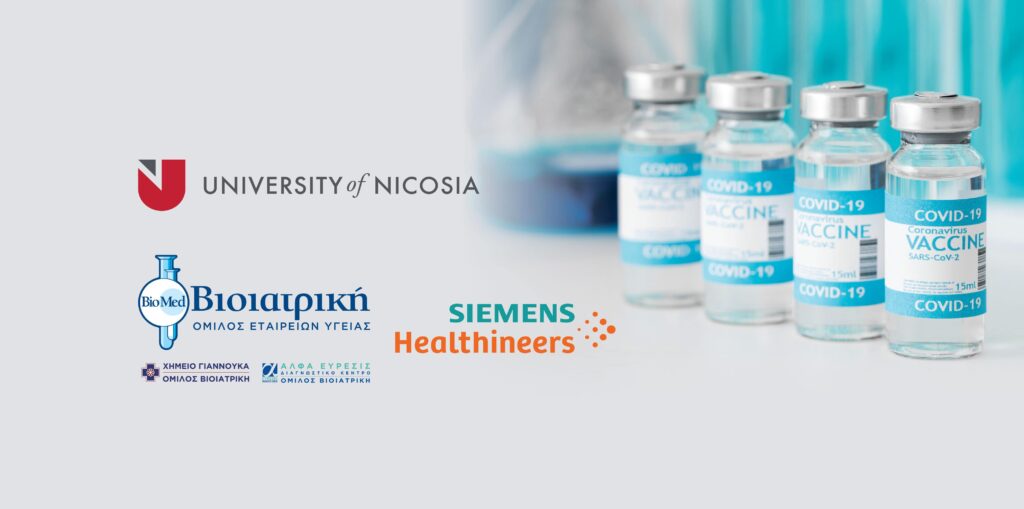
The results of the first round of relevant research by the University of Nicosia and Bioiatriki Healthcare Group are published.
The difference in antibody levels between natural illness and vaccination is significant, according to the results of the first round of a large study conducted by the Department of Life and Health Sciences of the University of Nicosia and Bioiatriki Healthcare Group with the support of SIEMENS (provision of laboratory consumables).
The study aims the analysis of antibodies’ (IgG) levels on Cypriot citizens against SARS-Cov-2 virus, the causative agent of COVID-19 disease. The innovation of the research focuses on the blind recruitment of volunteers who were invited to participate in the framework of their established clinical analyses at the Yiannoukas Medical Laboratories – Bioiatriki Healthcare Group. The first part of the research includes data on antibody levels in the population, while the second part will evaluate the immunity provided by T-cells (cell-mediated immunity).
The first round of the study includes 591 citizens aged 18 to 87 from all over Cyprus, including (see Figure 1):
- A) citizens who were not infected with COVID-19 and were not vaccinated,
- B) citizens who were infected with COVID-19 and were not vaccinated,
- C) citizens who were not infected with COVID-19 and were vaccinated against the virus, and
- D) citizens who were infected with CVID-19 and were vaccinated against the virus.
The first part of the study leads to important findings about humoral immunity (antibody-mediated immunity) (B-cells activation which produce antibodies against a specific antigen – in our case the virus) against coronavirus which might assist the scientific world’s response against the pandemic.
Results
The results highlight a significant difference in antibody levels achieved between natural illness and vaccination. Vaccination with any of the approved vaccines in Cyprus leads to the production of significantly higher antibody level than from the natural illness and possibly higher humoral immunity (Figure 2) in all age groups studied.
The observation that vaccination after the disease results in the production of extremely high levels of antibodies in the infected individuals is of equally importance, which demonstrates the necessity of vaccination even in individuals who have been infected in the past (Figure 2).
A comparison between the antibody levels of people who got infected but were not vaccinated and those who did not get infected but were vaccinated shows that even a single vaccine shot leads to higher antibody levels (Figure 3).
Increase in antibody levels after vaccination is also shown by the levels of antibodies at the young age groups in which, although the incidence of the disease is high, the antibodies remain low compared to the older age groups, which may be due to the lower vaccination rate in the first age group (Figure 4).
“Vote of confidence” in the national vaccination program
The general coordinator of the research and Head of the Department of Life and Health Sciences of the University of Nicosia, Professor Kyriakos Felekkis stated: “continuous assessment of immunity in the population with data collection, is very important at this stage of the pandemic.
“We hope that the results of our research will contribute to the formulation of an evidence-based policy, thus helping the strategy of the vaccination program and the whole effort to immunize the population“.
“Our collaboration with one of the largest organizations providing diagnostic services in the country“, he continued, “gives us the tools to carry out a comprehensive study on the Cypriot population to draw the right conclusions“.
On behalf of Bioiatriki Healthcare Group Kyriakos Yiannoukas, stated: “We are very happy for the successful completion of the first part of this great and ambitious research, in which we actively contributed by conducting sampling all over Cyprus, in some of our 16 sampling points and of course by measuring antibodies’ levels in our laboratories using the most modern medical devices by SIEMENS.
We, in turn, want to give a vote of confidence to the national vaccination program, which, based on the first results, leads to a significant increased level of antibodies in the population.
Our partnership with the University of Nicosia in the field of research as part of the broader strategic collaboration we have created, highlights the great potential that exist for the development of biomedical science for the benefit of society as a whole.
Research Team:
University of Nicosia: Prof. Kyriakos Felekkis, Dr. Christos Petrou, Dr. Christos Papaneofytou, Dr. Myrtani Pieri, Dr. Viky Nikolaidou, Dr. Ioannis Sarigiannis and Dr. Eleftheria Galatou
Bioiatriki Healthcare Group: Mr. Kyriakos Yiannouka, Mrs. Antria Nikolaou, Mr. Christos Themistokleous, Miss Tonia Stavraki and Mr. Tasos Kalogiannis.
Next steps
The second round of research will begin in mid-September. The expected study, among other things, will be on both cellular immunity and the levels of immunity on specific population groups. Relevant announcements on University of Nicosia and Bioiatriki Healthcare Group web pages.
